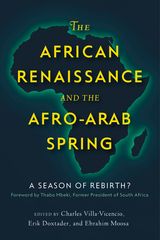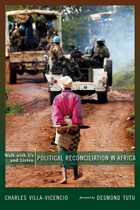
The African Renaissance and the Afro-Arab Spring addresses the often unspoken connection between the powerful call for a political-cultural renaissance that emerged with the end of South African apartheid and the popular revolts of 2011 that dramatically remade the landscape in Egypt, Libya, and Tunisia. Looking between southern and northern Africa, the transcontinental line from Cape to Cairo that for so long supported colonialism, its chapters explore the deep roots of these two decisive events and demonstrate how they are linked by shared opposition to legacies of political, economic, and cultural subjugation. As they work from African, Islamic, and Western perspectives, the book’s contributors shed important light on a continent’s difficult history and undertake a critical conversation about whether and how the desire for radical change holds the possibility of a new beginning for Africa, a beginning that may well reshape the contours of global affairs.

No one can deny how September 11, 2001, has altered our understandings of "Peace" and "Justice" and "Civil Conflict." Those have become words with startling new life in our vocabularies. Yet "making" peace and "doing" justice must remain challenges that are among the highest callings of humanity—especially in a terror-heightened world. Nigel Biggar, Christian ethicist and editor of this now more than ever "must read" (Choice) volume, newly expanded and updated, addresses head-on the concept of a redemptive burying of the past, urging that the events of that infamous date be approached as a transnational model of conflict-and suggesting, wisely and calmly, that justice can be even the better understood if we should undertake the very important task of locating the sources of hostility, valid or not, toward the West.
Burying the Past asks these important questions: How do newly democratic nations put to rest the conflicts of the past? Is granting forgiveness a politically viable choice for those in power? Should justice be restorative or retributive? Beginning with a conceptual approach to justice and forgiveness and moving to an examination of reconciliation on the political and on the psychological level, the collection examines the quality of peace as it has been forged in the civil conflicts in Rwanda, South Africa, Chile, Guatemala and Northern Ireland.
There are times in history when "making peace" and "doing justice" seem almost impossible in the face of horrendous events. Those responses are understandably human. But it is in times just like these when humanity can—and must—rise to its possibilities and to its higher purposes in order to continue considering itself just and humane.

Effective peace agreements are rarely accomplished by idealists. The process of moving from situations of entrenched oppression, armed conflict, open warfare, and mass atrocities toward peace and reconciliation requires a series of small steps and compromises to open the way for the kind of dialogue and negotiation that make political stability, the beginning of democracy, and the rule of law a possibility.
For over forty years, Charles Villa-Vicencio has been on the front lines of Africa's battle for racial equality. In Walk with Us and Listen, he argues that reconciliation needs honest talk to promote trust building and enable former enemies and adversaries to explore joint solutions to the cause of their conflicts. He offers a critical assessment of the South African experiment in transitional justice as captured in the Truth and Reconciliation Commission and considers the influence of ubuntu, in which individuals are defined by their relationships, and other traditional African models of reconciliation. Political reconciliation is offered as a cautious model against which transitional politics needs to be measured. Villa-Vicencio challenges those who stress the obligation to prosecute those allegedly guilty of gross violation of human rights, replacing this call with the need for more complementarity between the International Criminal Court and African mechanisms to achieve the greater goals of justice and peace building.
READERS
Browse our collection.
PUBLISHERS
See BiblioVault's publisher services.
STUDENT SERVICES
Files for college accessibility offices.
UChicago Accessibility Resources
home | accessibility | search | about | contact us
BiblioVault ® 2001 - 2024
The University of Chicago Press









